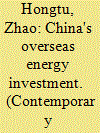|
|
|
Sort Order |
|
|
|
Items / Page
|
|
|
|
|
|
|
| Srl | Item |
| 1 |
ID:
086730


|
|
|
|
|
| Publication |
2009.
|
| Summary/Abstract |
China's rapidly incerasing demands for energy has been a subject for debate for years. To climate observers, the most important issue is how to safeguard energy supply and maintain economic growth. To most western analysts, the more crusial issue is how Chinese energy policies and activities will affect world energy markets and world politics.
|
|
|
|
|
|
|
|
|
|
|
|
|
|
|
|
| 2 |
ID:
127295


|
|
|
|
|
| Publication |
2014.
|
| Summary/Abstract |
Sovereign Wealth Funds (SWFs) are state-owned investment funds that invest in real and financial assets. Since the global financial crisis in 2008, SWFs' investments have resulted in national security concerns of host countries because SWFs continue to expand rapidly and have become increasingly active in real-time strategic transactions. Given this background, China, which has the biggest SWF in the world, is facing severe challenges of energy resources shortages while its plan is to accomplish social and economic development goals. Energy security is a key driving force of the energy investment policy of China's SWFs. This makes the SWF investments more complicated and more politically sensitive. The combination of sovereign rights and the strategic importance of energy also makes geopolitics more complicated and brings more uncertainty to SWF investments. This article explores the relationship between energy security and energy investments of China's SWFs. It is recognised that the energy investment of SWFs must follow a sustainable path to coordinate energy security, economic growth, return on investment and national security concerns. Government policymakers are urged to balance the financial and political returns on SWFs against potential negative effects. The conclusion presents insights for policymakers, energy scholars and SWF researchers.
|
|
|
|
|
|
|
|
|
|
|
|
|
|
|
|
| 3 |
ID:
074841


|
|
|
| 4 |
ID:
176770


|
|
|
|
|
| Summary/Abstract |
The international community has reached a consensus on preventing the global climate from deterioration by stabilizing greenhouse gas concentrations in the atmosphere. Energy industry is a key field for greenhouse gas emission, and investment in the energy industry plays a crucial part in promoting the low-carbon development of China's energy industry. Energy investment can effectively break the high carbon ″lock-in effect″ of energy industry and achieve the low-carbon development of energy industry by guiding, regulating and gathering social funds into the field of cleaner production and the field of low-carbon technology. Based on the unified framework of energy, economy and environment, this article takes 30 provinces in China as the research object, and constructs a spatial econometric model to investigate the impact of energy investment and economic growth on carbon emission reduction. The results indicate that both energy investment and economic growth are responsible for the increase of China's provincial CO2 emissions, but their driving mechanisms are significantly different. Furthermore, the increase of carbon emissions in adjacent provinces will bring about the increase of local carbon emissions through spatial spillover effects. Based on these findings, the corresponding countermeasures and policy suggestions are put forward.
|
|
|
|
|
|
|
|
|
|
|
|
|
|
|
|
| 5 |
ID:
176871


|
|
|
|
|
| Summary/Abstract |
The global flows of foreign investment are increasingly curtailed by tightening investment screening policies. Several states, including Australia, Germany, Japan and the United States, have recently updated their investment screening legislation to cover new industries, transactions and buyers in order to protect sectors deemed sensitive to national or public security. In this article, we analyze the implications of the evolving investment screening landscape for the energy sector. Based on the comparative appraisal of regulatory and administrative developments primarily in the United States and the European Union, we identify the most significant policy changes and their likely outcomes for the energy sector. By analyzing law, policy and individual screening decisions, we demonstrate how investment screening increasingly encroaches on new segments of the energy value chain and poses new challenges for international energy investments. Most importantly, the changing investment screening practices are likely to affect cross-border transactions in energy infrastructures, energy technologies and data-intensive technologies, including the digitalization of the energy sector and concerns over the protection of personal data. We further suggest that the new types of security issues addressed in investment screening legislation and policy push the boundaries of the traditional notions of energy security.
|
|
|
|
|
|
|
|
|
|
|
|
|
|
|
|
| 6 |
ID:
168666


|
|
|
|
|
| Summary/Abstract |
The world is facing serious energy situation. The sense of urgency to guarantee energy security is constantly increasing for many countries. Exploiting foreign energy markets through international investment has become a significant strategy to resolve energy risks and optimize the distribution of energy sources. Central Asia, with the important geographical position and various abundant energy resources, has attracted the interest of the international community and become a popular destination of foreign investments. However, the corruption risk, inter alia, is a big concern for foreign investors, especially in the energy sector. The proportion of corruption in international investment arbitration cases with the five Central Asian countries as the Respondent is high up to 75% in the energy field. Choosing Central Asia as the investment destination in situations like these is a decision made after weighing both the opportunities and risks, with the purpose to establish resource-seeking investment. Against this backdrop, this paper aims to provide policy implications for government regulators, policy makers, and foreign investors. It is suggested to modify bilateral investment treaties, establish legal framework of Central Asian countries, adopt investment facilitation measures, strengthen self-discipline and self-protection of investors and strengthen investment guarantee system.
|
|
|
|
|
|
|
|
|
|
|
|
|
|
|
|
|
|
|
|
|